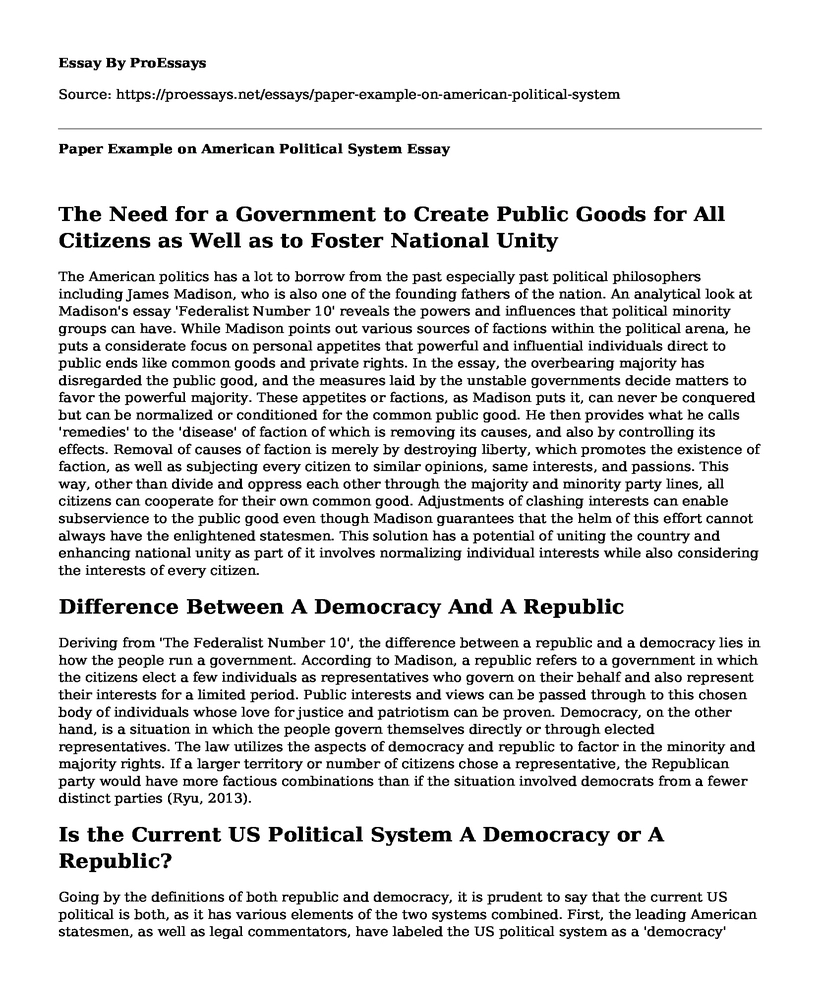The Need for a Government to Create Public Goods for All Citizens as Well as to Foster National Unity
The American politics has a lot to borrow from the past especially past political philosophers including James Madison, who is also one of the founding fathers of the nation. An analytical look at Madison's essay 'Federalist Number 10' reveals the powers and influences that political minority groups can have. While Madison points out various sources of factions within the political arena, he puts a considerate focus on personal appetites that powerful and influential individuals direct to public ends like common goods and private rights. In the essay, the overbearing majority has disregarded the public good, and the measures laid by the unstable governments decide matters to favor the powerful majority. These appetites or factions, as Madison puts it, can never be conquered but can be normalized or conditioned for the common public good. He then provides what he calls 'remedies' to the 'disease' of faction of which is removing its causes, and also by controlling its effects. Removal of causes of faction is merely by destroying liberty, which promotes the existence of faction, as well as subjecting every citizen to similar opinions, same interests, and passions. This way, other than divide and oppress each other through the majority and minority party lines, all citizens can cooperate for their own common good. Adjustments of clashing interests can enable subservience to the public good even though Madison guarantees that the helm of this effort cannot always have the enlightened statesmen. This solution has a potential of uniting the country and enhancing national unity as part of it involves normalizing individual interests while also considering the interests of every citizen.
Difference Between A Democracy And A Republic
Deriving from 'The Federalist Number 10', the difference between a republic and a democracy lies in how the people run a government. According to Madison, a republic refers to a government in which the citizens elect a few individuals as representatives who govern on their behalf and also represent their interests for a limited period. Public interests and views can be passed through to this chosen body of individuals whose love for justice and patriotism can be proven. Democracy, on the other hand, is a situation in which the people govern themselves directly or through elected representatives. The law utilizes the aspects of democracy and republic to factor in the minority and majority rights. If a larger territory or number of citizens chose a representative, the Republican party would have more factious combinations than if the situation involved democrats from a fewer distinct parties (Ryu, 2013).
Is the Current US Political System A Democracy or A Republic?
Going by the definitions of both republic and democracy, it is prudent to say that the current US political is both, as it has various elements of the two systems combined. First, the leading American statesmen, as well as legal commentators, have labeled the US political system as a 'democracy' (Shafer, 2016). Rather than directly, people rule through elected representatives in a democratic system in which voting takes place. This is the representative aspect of democracy, and the US system uses it. Secondly, in a 'republic' the supreme power is trusted with a body of individuals who are also allowed to vote for representatives, state officers or legislators. The Electoral College, in which the election of the American president is carried out, allows public participation. The constitution itself is both republican and democratic by design, and this is why democrats and republicans are the major parties (Volokh, 2015).
References
Madison, J. (1787). The Federalist Paper No. 10. Retrieved from http://avalon.law.yale.edu/18th_century/fed10.asp
Volokh, E. (2015). Is the United States of America a republic or a democracy?. Retrieved from https://www.washingtonpost.com/news/volokh-conspiracy/wp/2015/05/13/is-the-united-states-of-america-a-republic-or-a-democracy/?noredirect=on&utm_term=.7cb505236a90
Ryu, J. (2013). "A Republic Is Different from Democracy": Critical Review of the Republic-Democracy Controversy at the U.S. Constitutional Convention. The Journal Of International Relations, 16(1). doi: 10.15235/jir.2013.06.16.1.179
Shafer, B. E.(2016). The American Political Pattern: Stability and Change, 1932 - 2016. Lawrence: University Press of Kansas.
Cite this page
Paper Example on American Political System. (2022, Jul 01). Retrieved from https://proessays.net/essays/paper-example-on-american-political-system
If you are the original author of this essay and no longer wish to have it published on the ProEssays website, please click below to request its removal:
- French and British Rules over the Indians of North America
- The Leader in Nelson Mandela Essay
- Policy, Government, and Law in the Prevention of Opioid Overdose
- Essay Example on Hugh Williamson: Founding Father of the USA
- Essay Example on Texas Republican Party: A Political Overview.
- Conflict Between US Govt & Military: Problems Since Rev War - Essay Sample
- Essay Example on Hong Kong-China Divide: Clash of Legal Systems







